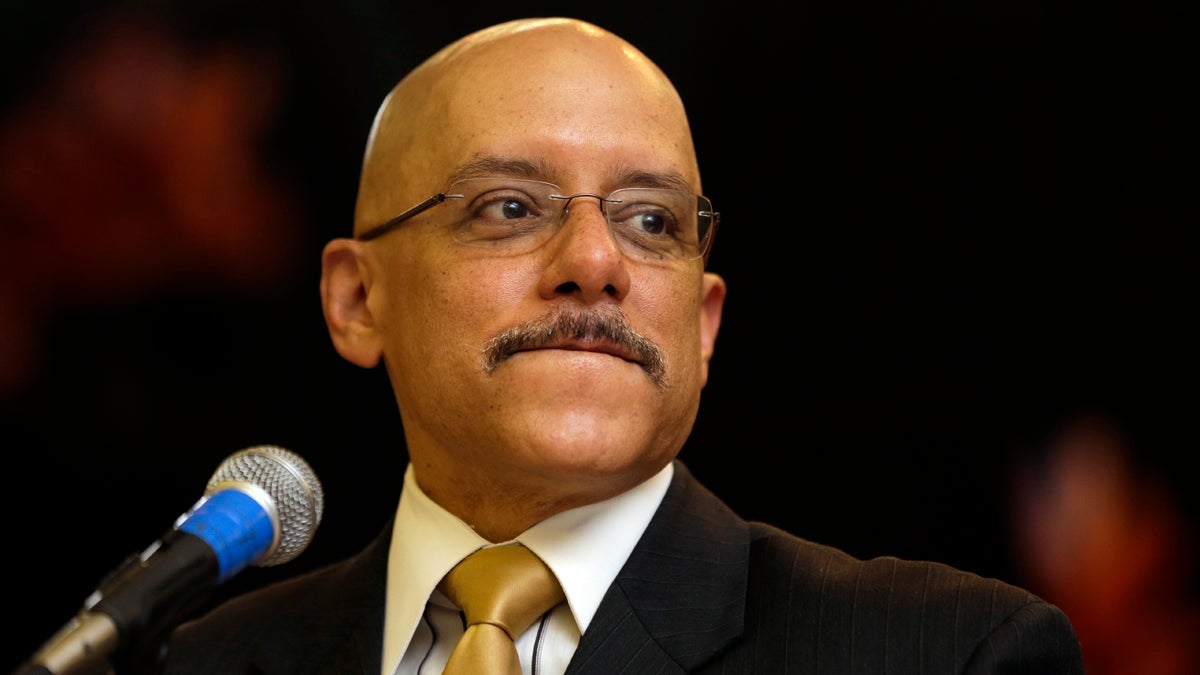Worrying about Philadelphia’s black vote
Listen
Pennsylvania state Sen. Vincent Hughes (Matt Rourke/AP Photo)
As this insane presidential election winds toward its conclusion, Democratic leaders in Pennsylvania have their eye on Philadelphia, and especially African-American neighborhoods.
For Hillary Clinton and Democratic U.S. Senate candidate Katie McGinty to win Pennsylvania, Philadelphia must give them not just lop-sided margins, but robust turnout as well.
I looked up some numbers.
In 2008, Philadelphia gave Barack Obama a margin of 478,000 votes, and he carried the state comfortably. It was pretty much the same in 2012.
In between, in 2010, Democratic U.S. Senate candidate Joe Sestak won the city by about the same percentage as Obama, but lower turnout in Philly left him with a margin of just 290,000 votes, not enough to offset Republicans in other parts of the state. The result: Republican Pat Toomey went to Washington.
What’s the worry?
There are a few reasons for Democratic leaders to worry.
One might be called the Obama hangover — black voters feeling a letdown after voting for President Obama in the last two elections.
It isn’t that many will vote for Trump (though some Republicans believe they have a hidden black vote). It’s more that they won’t feel the same determination to get themselves and all their friends and relations to the polls.
Several leaders of the Black Clergy of Philadelphia and Vicinity met in North Philadelphia with McGinty and South Carolina U.S. Rep. James Clyburn to talk about the election.
Afterward, the Rev. Wayne Weathers said, yes, there’s some concern, particularly about younger voters.
“There are some within the millennial generation that we, as clergy, are working with to get them out to vote,” he said. “But the enthusiasm is on the rise.”
The Clinton campaign has invested heavily in field operations, and the city Democratic Party is going to hand out a few hundred thousand dollars in Election Day “street money” to ward leaders to make sure they’ll do their job in the neighborhoods.
So voters should get plenty of reminders when election day comes.
Trouble coming?
The second concern is voter suppression efforts.
Donald Trump has warned of cheating and urged his followers to go and “watch the polls” in certain areas.
His ally Roger Stone has an organization called “Stop the Steal” that’s raising money and planning an “exit polling” operation which Democrats assert could be an effort to intimidate minority voters.
And there was a story in Politico about right-wing fringe groups that are talking about mounting an aggressive effort in Philadelphia.
One anonymous person said his group was putting hidden cameras in Philadelphia polling places. Another, also unnamed, talked about handing out 40-ounce beers and pot in black communities to distract them from voting.
I’m skeptical of all of this, as I am of the notion that the Trump team will mount any serious monitoring or suppression effort. I’ve talked to a couple of people who signed up online to be a “Trump election observer.” They were never contacted about anything but contributions.
I asked Philadelphia state Sen. Vincent Hughes if he is worried about all this.
He said Democrats should be ready, but he also doubts it will amount to much. And he said the threats of suppression efforts could actually benefit Democrats.
“Their efforts will in fact spur more turnout and increased engagement,” Hughes told me. “When we feel somebody’s trying to deny us something that is rightfully ours, something that we fought and died for, we rebel against that by getting more engaged in the electoral process.”
Democrats have filed a lawsuit against the Trump campaign and Stone’s organization, asking the court enjoin them from certain activities on Election Day.
A Republican lawsuit to expand the reach of poll watchers in Pennsylvania went nowhere. U.S. District Judge Gerald Pappert upheld the current rule for poll watchers — they’re confined to polling places in their home county.
The wild card
There’s one thing Philadelphia Democrats worry about that isn’t caused by Republicans — the SEPTA strike, which could dampen turnout if it isn’t resolved by Tuesday.
It isn’t that Philadelphians will lack transportation to the polls — most live within walking distance, and there should be plenty of vans ready for those who need a lift.
It’s that the strike will disrupt voters’ lives, adding time to their commutes and making it harder to get their kids to school and day care. Some harried folks are bound to let voting slip through the cracks.
More than one person has pointed out that the chair of the SEPTA board, Pat Deon, is a Bucks County Republican who may not feel the urgency about a deal that a Democrat might.
I’ve heard that if the strike isn’t resolved by the weekend, President Obama may get involved. I’m not sure exactly what he’d do — I can’t see either side making a lot of long-term economic concessions to clear the way for the election. But I could be wrong.
In any case, there will be intense interest in the vote in Philadelphia Tuesday.
WHYY is your source for fact-based, in-depth journalism and information. As a nonprofit organization, we rely on financial support from readers like you. Please give today.


